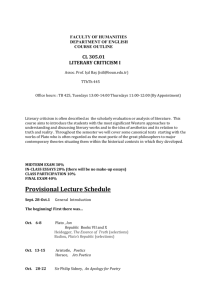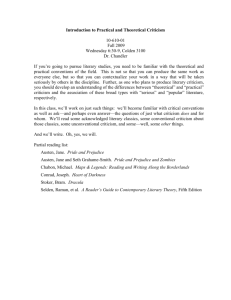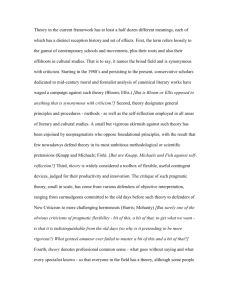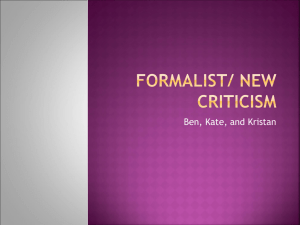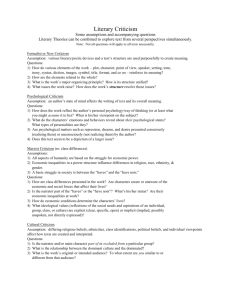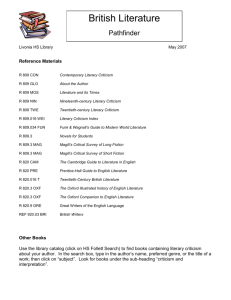Perry-Samaniego
advertisement
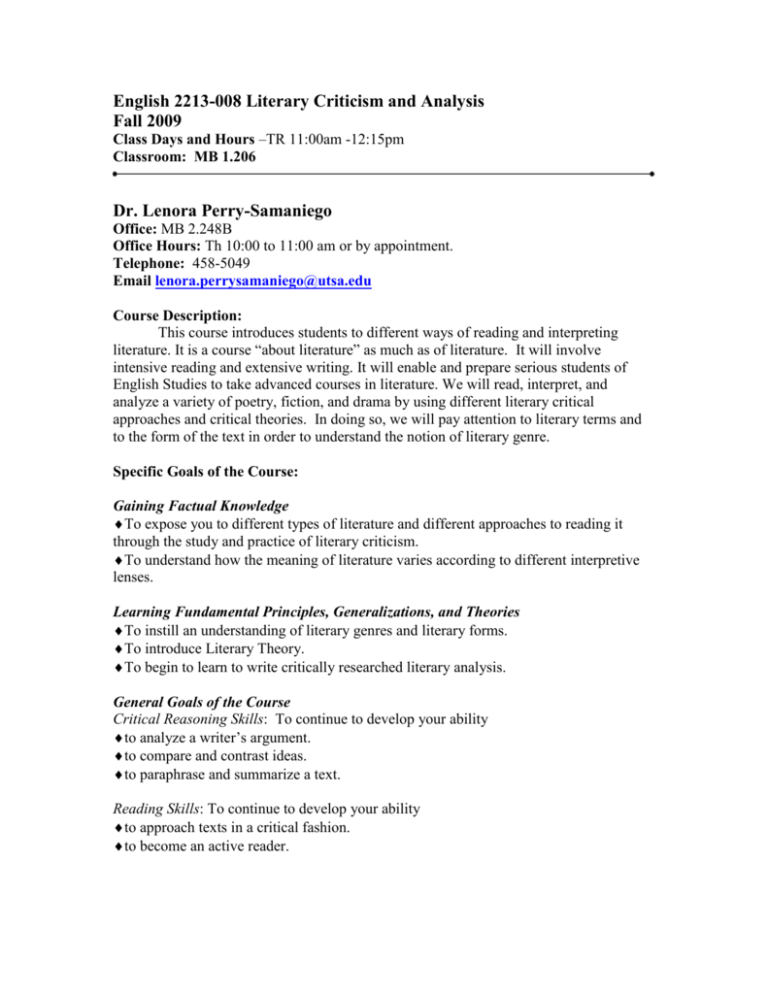
English 2213-008 Literary Criticism and Analysis Fall 2009 Class Days and Hours –TR 11:00am -12:15pm Classroom: MB 1.206 Dr. Lenora Perry-Samaniego Office: MB 2.248B Office Hours: Th 10:00 to 11:00 am or by appointment. Telephone: 458-5049 Email lenora.perrysamaniego@utsa.edu Course Description: This course introduces students to different ways of reading and interpreting literature. It is a course “about literature” as much as of literature. It will involve intensive reading and extensive writing. It will enable and prepare serious students of English Studies to take advanced courses in literature. We will read, interpret, and analyze a variety of poetry, fiction, and drama by using different literary critical approaches and critical theories. In doing so, we will pay attention to literary terms and to the form of the text in order to understand the notion of literary genre. Specific Goals of the Course: Gaining Factual Knowledge To expose you to different types of literature and different approaches to reading it through the study and practice of literary criticism. To understand how the meaning of literature varies according to different interpretive lenses. Learning Fundamental Principles, Generalizations, and Theories To instill an understanding of literary genres and literary forms. To introduce Literary Theory. To begin to learn to write critically researched literary analysis. General Goals of the Course Critical Reasoning Skills: To continue to develop your ability to analyze a writer’s argument. to compare and contrast ideas. to paraphrase and summarize a text. Reading Skills: To continue to develop your ability to approach texts in a critical fashion. to become an active reader. Writing Skills: To continue to develop your ability to write clearly and economically with grammatical correctness. to formulate and support a thesis. to incorporate sources and document them, using appropriate citation. Required Texts: Tyson, Lois. Critical Theory Today: A User Friendly Guide. (Garland Publishing). Meyer, Michael. The Compact Bedford Introduction to Literature: Reading, Thinking, Writing. 7th Ed. Boston: Bedford/St. Martins, 2006. Viramontes, Helena Maria. Under the Feet of Jesus. Plume/Penguin, 1996. Class procedures Class attendance: It is in the student’s best interest to attend all scheduled classes, however, emergencies do happen. If you miss class because of a scheduled school sponsored event, please inform the instructor by email prior to the event. If you miss because of illness, please send an email anyway. Missed work is your responsibility. Excessive absences will result in a failed grade. For a T/R class, missing 5 classes is EXCESSIVE. Lateness is the same as absence should it become habitual. Leave early, arrive early, and find a parking place. Purchase and bring the assigned books to class. You can’t be eligible for a participation grade without having the book and having read it. Assignments are due on the date assigned unless arrangements have been made prior to the turn-in date (for example, an athletic absence). All work done outside the classroom must be word-processed and must be done in MLA format. An excellent resource is the MLA Handbook for Writers of Research Papers edited by Gibaldi. Save all your work as you complete drafts, revisions, and finals. For your own protection and for the satisfaction of seeing it accomplished, keep track of ALL your work! Grading Attendance and Response Papers Paper 1 Research Paper Exam 1 Final Exam 20% 15% 25% 20% 20% Response Papers: These will be over the material in your text(s). They will entail close reading of your texts. You cannot just skim the material, because these papers will require you to think critically about factual and plot details. Invest the time and read the material. Paper I (3-5 pages) and Research Paper (5-8 pages): It is useful to take notes or diagram texts and questions as you read. It helps to keep you focused and on target with your reading. The practices will also aid in drafting your papers, of which you will write two. Presume that I have read the material. Do not summarize the plot. You will need to pick texts for your research paper that differ from the ones you chose to analyze for your first paper. In other words, you cannot use a first-paper topic for your research paper. Exam One/Midterm The first exam will be a traditional exam (you will not be allowed to bring books or notes to the exam), held during class time. The exam will be on all the material covered up until the exam day. It will ask you to compare and contrast two texts according to their form and/or theme and define important terminology used in class. Final Exam This exam will be comprehensive. This means that all the material covered in the course and all the reading we have done in-class is eligible to be included. It will be an openbook exam. Consequently, note taking is important. Plagiarism Plagiarism occurs when you have inadequately recognized work that is not your own or represent the work of others as yours. Should I encounter plagiarism, the grade assigned will automatically be a failing grade and the incident will be referred to Academic Affairs. I routinely submit randomly selected student papers to plagiarism detection databases. Course Schedule Week 1 Aug 27: Week 2 Sept 1: Sept 3: Course Introduction Introduction, CB 1-7 Chapter 1, “Reading Fiction,” Kate Chopin, “The Story of an Hour.” Karen Van Der Zee, “From A Secret Sorrow,” Gail Goodwin, “A Sorrowful Woman.” Chapter 3, “Plot,” pp. 69-70; 90-116. Week 3 Sep 8: Chapter 4, “Character,” pp. 117-61 & see definition on p. 1622. Sep 10: Chapter 5, “Setting” pp. 163-71 & see definition on p. 1639. Response Paper Due Week 4 Sep 15: Sep 17: Week 5 Sep 22: Sep 24: Week 6 Sep 29: Oct 1: Week 7 Oct 6: Oct 8: Week 8 Oct 13: Chapter 19, “Reading Poetry,” pp. 569-605 AND Chapter 1 CTT, “Everything you wanted to know about critical theory but were afraid to ask,” pp. 1-10. Chapter 12, CTT “Postcolonial Criticism” pp. 417-33. Response Paper Due Postcolonial Criticism, cont. & Chapter 32, Langston Hughes pp. 907-36. Suggested readings: “Border Crossings” — between pp. 1038-39. Julia Alvarez, “Five poems,” pp. 937-64 & Response Paper Due Chapter 2 CTT “Psychoanalytic Criticism.” & Chapter 38 CB “Reading Drama”1045-63. Exam I in class. / Psychoanalytic Criticism, cont. Chapter 39 “Writing about Drama,” pp. 1088-93. Chapter 45 “Plays for further reading,” & Begin Death of a Salesman, Act One: pp. 1371-1402. Death of a Salesman, Act Two 1402-??. ***Actors from London Stage *** (tentative visit.) & Kennedy, “A Visit from St. Sigmund” pp. 797-98. Response Paper Due Finish Death of a Salesman & Psychoanalytic Criticism — Draft paper I, bring paper to class. Oct 15 Paper I Due Week 9 Oct 20: Chapter 3 CTT “Marxist Criticism,” pp. 53-81. Oct 22: Marxist Criticism, cont. Under the Feet of Jesus. Week 10 Oct 27: Under the Feet of Jesus, Oct 29: UFJ. Response paper due. Week 11 Nov 3: CTT Chapter 4 “Feminist Criticism” Nov 5: “Feminist Criticism,” cont. & Obejas, “We Came all the Way…” pp. 194-204 & Divakaruni, “Clothes” 532-41; Kincaid, “Girl” 541-42. Response paper Week 12 Nov 10: CTT Chapter 10 “Lesbian, Gay and Queer Criticism” Nov 12: Lizer, “Dolls & Dolls” from Will & Grace pp. 1081-87; “Rodeo,” 1368-70. Response Paper Week 13 Nov 17: Queer Theory, cont. RESEARCH PAPER TOPICS DUE Nov 19: Films and readings. Week 14 Nov 24: RESEARCH PAPER Workshop Nov 26: Thanksgiving Holiday — No classes Week 15 Dec 1: Research Papers Due Dec 3: Review Day. Dec 7 Dec 8 Student Study Days- classes do not meet Student Study Days- classes do not meet Final Exam: Wednesday 15-Dec 10:30 AM - 1:00 PM
